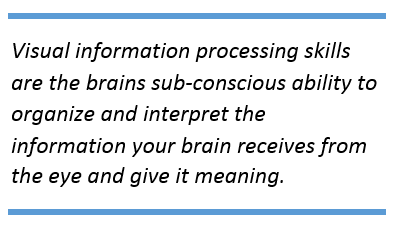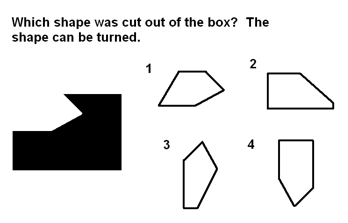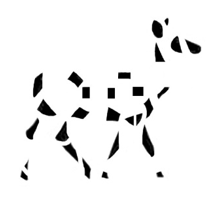Visualization and Related Developmental Skills

Visualization
The ability to create or alter new images in the mind. It is needed in reading, conceptualizing problems, and playing sports.
Form Constancy
Closely linked to visualization, Form Constancy is the ability to recognize two objects that have the same shape but different size or position and to mentally manipulate forms and visualize the outcome. Children that struggle with this skill may frequently reverse letters and numbers. This ability is needed to tell the difference between "b" and "d", "p" and "q", "m" and "w".
Visual Spatial Relations
 Closely linked to visualization, Visual Spatial Relations is the ability to distinguish differences among similar objects or forms. This is needed in reading and math. Children that struggle with this skill have the challenge in problem-solving and conceptual skills required for higher level science and math.
Closely linked to visualization, Visual Spatial Relations is the ability to distinguish differences among similar objects or forms. This is needed in reading and math. Children that struggle with this skill have the challenge in problem-solving and conceptual skills required for higher level science and math.

Visual Closure
Closely linked to visualization, Visual Closure is the ability to identify or recognize a symbol or object when the entire object is not visible and to visualize a complete whole when given incomplete information. Children struggling with this skill may have difficulty in not remembering or comprehending what has been read. They might be unable to picture in the mind's eye descriptions, directions or instructions.

Discrimination
Closely linked to visualization, Discrimination is the ability to discriminate between visible likeness and differences in size, shape, pattern, form, position, and color. Such as the ability to distinguish between similar words like "ran" and "run". Children that struggle with this skill have a hard time distinguishing between similarly spelled words such as was/saw, then/when, etc.
Figure-Ground
 The ability to recognize distinct shapes from their background, such as objects in a picture, or letters on a chalkboard. The ability to perceive and locate a shape within a busy field. Children struggling with this skill, get lost in details. It affects their concentration, attention and they tend to have difficulty scanning text to locate specific information.
The ability to recognize distinct shapes from their background, such as objects in a picture, or letters on a chalkboard. The ability to perceive and locate a shape within a busy field. Children struggling with this skill, get lost in details. It affects their concentration, attention and they tend to have difficulty scanning text to locate specific information.
Other Information Processing Skills
The other information processing skills can be read about here.
